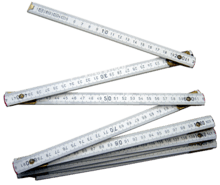metre
English
Alternative forms
Pronunciation
Etymology 1
From French mètre, from Ancient Greek μέτρον (métron, “measure, rule, length, size, poetic metre”)
Noun
metre (plural metres)
- The basic unit of length in the International System of Units (SI: Système International d'Unités), equal to the distance travelled by light in a vacuum in 1/299 792 458 seconds. The metre is equal to 3947⁄127 (approximately 39.37) imperial inches.
- 1797, The Monthly magazine and British register, No. 3
- The measures of length above the metre are ten times ... greater than the metre.
- 1873, The Young Englishwoman, April
- A dress length of 8 metres of the best quality costs 58 francs.
- 1928, The Observer, April 15
- The 12-metre yachts ... can be sailed efficiently with four paid hands.
- 1797, The Monthly magazine and British register, No. 3
Usage notes
- This, rather than meter, is the spelling adopted by both the International Bureau of Weights and Measures and the International Organization for Standardization in their English language texts. However the U.S. National Institute of Standards and Technology, in accordance with the United States Government Printing Office Style Manual, has chosen to use meter.
Synonyms
Derived terms
Translations
|
|
See also
- Appendix on SI Units
References
“metre” in the Collins English Dictionary, Glasgow: HarperCollins Publishers.
Further reading
Verb
metre (third-person singular simple present metres, present participle metring, simple past and past participle metred)
Usage notes
The standard spelling of the verb meaning to measure is meter throughout the English-speaking world. The use of the spelling metre for this sense (outside music and poetry) is possibly a misspelling.
Etymology 2
From Old English, from Latin metrum, from Ancient Greek See #Etymology 1
Noun
metre (plural metres) (Britain, Canada)
- The rhythm or measure in verse and musical composition.
Translations
Catalan
Pronunciation
Etymology 2
From Old Occitan metre, from Latin mittere, present active infinitive of mittō. Compare Occitan metre, French mettre, Spanish meter.
Conjugation
| infinitive | metre | ||||||
|---|---|---|---|---|---|---|---|
| present participle | metent | ||||||
| past participle | masculine | feminine | |||||
| singular | mes | mesa | |||||
| plural | mesos | meses | |||||
| person | singular | plural | |||||
| first | second | third | first | second | third | ||
| indicative | jo | tu | ell/ella vostè |
nosaltres nós |
vosaltres vós |
ells/elles vostès | |
| present | meto | mets | met | metem | meteu | meten | |
| imperfect | metia | meties | metia | metíem | metíeu | metien | |
| future | metré | metràs | metrà | metrem | metreu | metran | |
| preterite | metí | meteres | meté | metérem | metéreu | meteren | |
| conditional | metria | metries | metria | metríem | metríeu | metrien | |
| subjunctive | jo | tu | ell/ella vostè |
nosaltres nós |
vosaltres vós |
ells/elles vostès | |
| present | meti | metis | meti | metem | meteu | metin | |
| imperfect | metés | metessis | metés | metéssim | metéssiu | metessin | |
| imperative | — | tu | vostè | nosaltres | vosaltres vós |
vostès | |
| — | met | meti | metem | meteu | metin | ||
Synonyms
Old French
Conjugation
This verb conjugates as a third-group verb. This verb has irregularities in its conjugation. Old French conjugation varies significantly by date and by region. The following conjugation should be treated as a guide.
| simple | compound | ||||||
|---|---|---|---|---|---|---|---|
| infinitive | metre | avoir mis | |||||
| gerund | en metant | Use the gerund of avoir followed by the past participle | |||||
| present participle | metant | ||||||
| past participle | mis | ||||||
| person | singular | plural | |||||
| first | second | third | first | second | third | ||
| indicative | jo | tu | il | nos | vos | il | |
| simple tenses |
present | met | mez | met | metons | metez | metent |
| imperfect | metoie, meteie | metoies, meteies | metoit, meteit | metiiens, metiens | metiiez, metiez | metoient, meteient | |
| preterite | mis | meṣis | mist | meṣimes | meṣistes | misdrent | |
| future | metrai | metras | metra | metrons | metroiz, metreiz, metrez | metront | |
| conditional | metroie, metreie | metroies, metreies | metroit, metreit | metriiens, metriens | metriiez, metriez | metroient, metreient | |
| compound tenses |
present perfect | Use the present tense of avoir followed by the past participle | |||||
| pluperfect | Use the imperfect tense of avoir followed by the past participle | ||||||
| past anterior | Use the preterite tense of avoir followed by the past participle | ||||||
| future perfect | Use the future tense of avoir followed by the past participle | ||||||
| conditional perfect | Use the conditional tense of avoir followed by the past participle | ||||||
| subjunctive | que jo | que tu | qu’il | que nos | que vos | qu’il | |
| simple tenses |
present | mete | metes | mete | metons | metez | metent |
| imperfect | meṣisse | meṣisses | meṣist | meṣissons, meṣissiens | meṣissoiz, meṣissez, meṣissiez | meṣissent | |
| compound tenses |
past | Use the present subjunctive of avoir followed by the past participle | |||||
| pluperfect | Use the imperfect subjunctive of avoir followed by the past participle | ||||||
| imperative | – | tu | – | nos | vos | – | |
| — | met | — | metons | metez | — | ||
